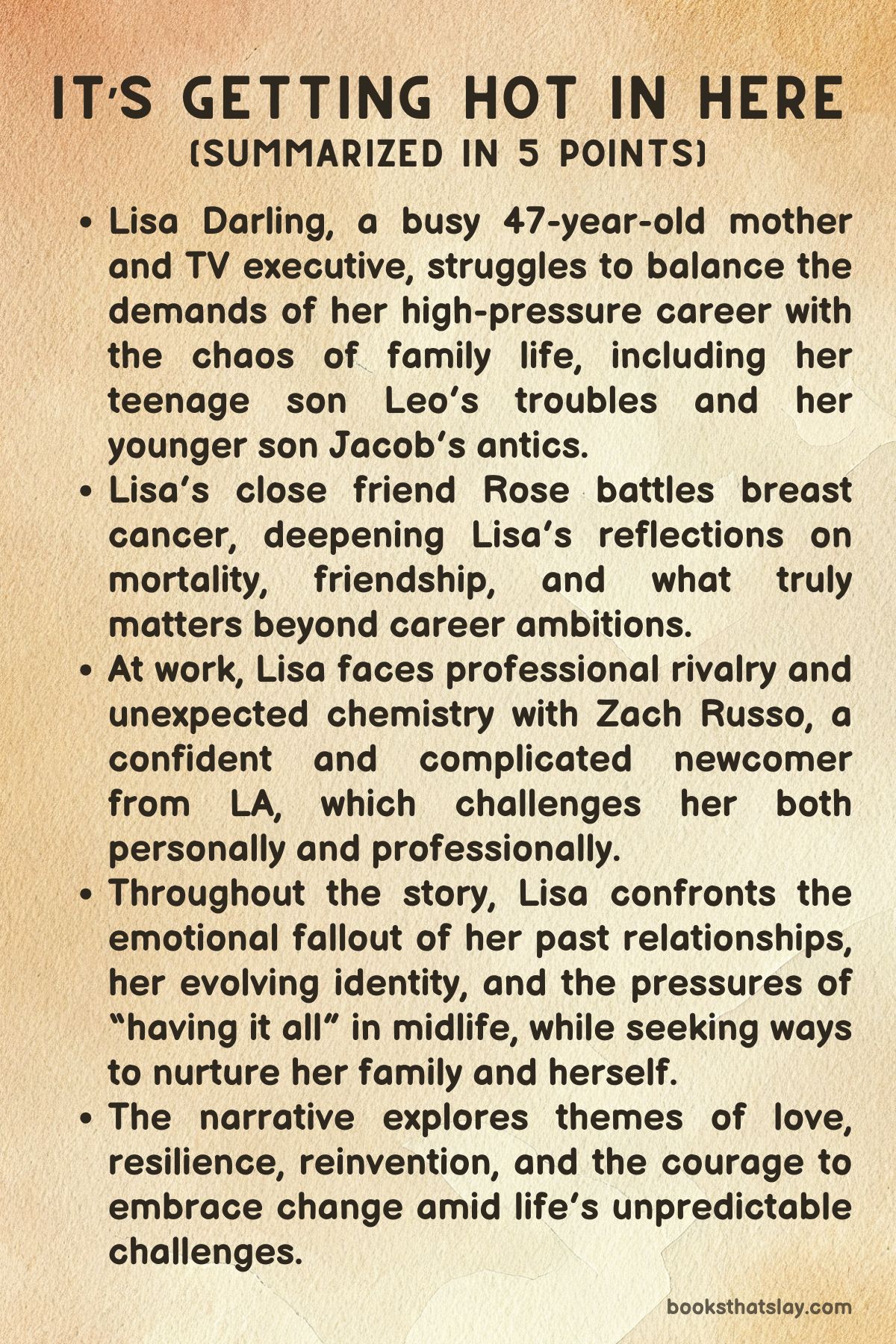It’s Getting Hot in Here Summary, Characters and Themes
It’s Getting Hot in Here by Jane Costello is a witty, heartfelt exploration of self-discovery, complicated relationships, and personal growth. The novel follows the life of Emme, a woman grappling with a breakup, body image issues, and emotional turmoil, all while navigating a fake engagement with her former high school friend, Ryan.
As their arrangement becomes more complicated, Emme must confront unresolved feelings for her ex, Teddy, and her growing attraction to Ryan. Costello masterfully intertwines humor with deeper themes of vulnerability, friendship, and self-empowerment as Emme learns to navigate her way through life’s unpredictable twists.
Summary
Emme’s life takes a dramatic turn when she discovers that her long-term boyfriend, Teddy, has been unfaithful. This betrayal shakes her deeply, especially because Teddy had previously made hurtful remarks about her appearance, which have exacerbated her ongoing struggles with body image.
The hurt from both his infidelity and his past criticisms leave Emme feeling vulnerable and emotionally exposed. Despite this, she is determined to move forward and maintain her composure.
As the emotional fallout from the breakup unfolds, Emme leans heavily on her best friend Grace, who is preparing for her upcoming wedding. However, Emme’s personal turmoil complicates her role as a supportive friend, especially as she struggles with her own feelings of insecurity and loss.
Emme tries to suppress her emotional distress by focusing on the wedding preparations, but the strain of dealing with Teddy’s betrayal and her body image issues starts to take its toll. Her self-esteem plummets, and she finds herself retreating from social situations, preferring to stay busy with distractions rather than confront her emotions.
The weight of her past with Teddy continues to hang over her, and she can’t help but feel torn between the desire to move on and the residual feelings she still harbors for him.
Amidst this turmoil, Emme reconnects with Ryan Ralston, a former high school friend who has since become a successful football player. Their friendship, once casual, begins to deepen as they navigate their personal struggles together.
Ryan, aware of Emme’s pain from her breakup, proposes a seemingly absurd solution: they will enter into a fake engagement. Ryan needs to enhance his public image to secure a business deal involving soccer franchises, and Emme needs a way to avoid the emotional stress of attending her ex’s wedding.
Despite the unconventional nature of their arrangement, Emme agrees, and the two of them begin to navigate their lives together under this pretense.
Though their engagement is a facade, the bond between Emme and Ryan begins to grow, challenging both of them in unexpected ways. Emme finds herself drawn to Ryan not just as a friend, but as someone who might offer a path toward healing and emotional recovery.
Ryan, on the other hand, begins to appreciate Emme in ways he hadn’t before. As their relationship evolves, they find themselves confronting not only the complexities of their fake engagement but also their growing feelings for each other.
This emotional evolution, complicated by their shared history and present circumstances, forces Emme to examine her feelings for both Teddy and Ryan.
While she continues to grapple with her insecurities and emotional baggage, Emme’s connection with Ryan offers her a glimpse of a different kind of relationship—one built on mutual support, respect, and understanding. However, the specter of her past, particularly her unresolved feelings for Teddy, continues to haunt her.
As Emme begins to open up to Ryan, she is forced to reckon with her own self-worth and the emotional scars left by her previous relationship. She slowly starts to see herself through Ryan’s eyes, realizing that she is more than the sum of her past mistakes and that she deserves love and happiness.
As Emme navigates her personal journey, she faces moments of humor and self-deprecation. She is constantly torn between her desire to move forward and the weight of the past, but the growth of her relationship with Ryan provides a sense of hope and emotional renewal.
Throughout their time together, Emme learns that healing is not a linear process, and that self-acceptance and emotional resilience are built over time. The narrative balances Emme’s emotional growth with moments of levity, as she begins to embrace her flaws and imperfections and let go of the insecurities that have long held her back.
Eventually, Emme reaches a point where she must decide what kind of future she wants—whether she will continue to live in the shadow of her past or take a leap of faith with Ryan and build something new. The tension between her past and her possible future with Ryan reaches a climax, and Emme finds herself standing at the crossroads of emotional and personal growth.
In the end, Its Getting Hot in Here is a story about reclaiming agency, embracing change, and discovering that love—both for oneself and for others—can heal even the deepest of wounds.
As Emme learns to shed the weight of her past and embrace the future, she finds that sometimes the best way forward is with a little bit of humor, a lot of vulnerability, and a strong support system. Through her journey, the novel highlights the importance of self-love, the complexity of relationships, and the possibility of new beginnings, even when the path ahead is uncertain.

Characters
Emme
Emme, the central character in It’s Getting Hot in Here, is a woman who is wrestling with the fallout from a painful breakup with her ex-boyfriend, Teddy. The heartbreak and betrayal she feels upon discovering Teddy’s infidelity are compounded by her long-standing struggles with body image issues.
Her sense of self-worth has been greatly impacted by Teddy’s hurtful comments about her appearance. Despite the pain, Emme attempts to maintain a facade of strength, diverting herself with the support of friends and daily distractions.
Throughout the story, Emme’s inner conflict is evident, as she balances her own emotional turmoil with her commitment to helping her friend Grace through her wedding preparations. Emme’s growth is tied to her interactions with Ryan Ralston, an old friend turned potential partner.
As their fake engagement develops, Emme begins to reflect more on her own needs, desires, and the emotional baggage she carries from her past relationships. Her journey is one of healing, self-discovery, and ultimately finding strength in vulnerability.
Lisa
Lisa’s character is a multifaceted portrayal of a woman caught in the throes of both professional ambition and personal turmoil. She is juggling the pressures of her high-stakes job as a TV executive while dealing with the complexities of motherhood and her relationships with her ex-husband, Brendan, and her rebellious teenage son, Leo.
Lisa’s struggles with Leo’s behavior, including his troubles with school and his involvement in dangerous situations like vaping and partying, are a constant source of emotional strain. Professionally, Lisa is constantly navigating the intricacies of office politics and the demands of her job, which is made even more difficult by her complicated relationship with a colleague, Zach Russo.
Initially, their professional rivalry gives way to a budding emotional connection, though it is fraught with challenges. The narrative delves into Lisa’s internal conflicts, including her doubts about her own body image and the societal pressures she faces as a mother in midlife.
Her relationship with Zach, complicated by his eventual decision to leave the country, further highlights her struggle to balance her own desires with her responsibilities. Lisa’s ultimate journey is one of self-realization and empowerment as she decides to prioritize her own happiness and well-being over the constant sacrifices she has made for others.
Zach Russo
Zach Russo, Lisa’s colleague, is initially portrayed as a professional rival, but over the course of the story, his relationship with Lisa evolves into something more personal. At first, Zach’s strong opinions on a modeling show that Lisa is overseeing create tension between them.
However, as they begin to connect more personally, their dynamic shifts, and Zach becomes a source of emotional complexity for Lisa. His role as a supportive figure, especially in the context of his unexpected decision to stay in the UK for Lisa and his daughter, Mila, adds depth to his character.
Zach’s personal life, particularly his decision to remain in the country despite career opportunities abroad, marks a pivotal turning point in the relationship between him and Lisa. His decision not only helps to heal the emotional rift between them but also symbolizes his willingness to invest in their future together.
Zach’s character is not just a romantic interest but also a catalyst for Lisa’s own emotional growth, as he challenges her to confront her own desires and vulnerabilities. His surprise decision to stay, rather than leave, illustrates his commitment and emotional depth, making him a key figure in Lisa’s eventual resolution and self-discovery.
Leo
Leo, Lisa’s teenage son, serves as a poignant representation of the struggles and tensions between parents and their adolescent children. His rebelliousness, including his struggles with academics and his involvement in a troubling party incident, creates significant emotional turmoil for Lisa.
The friction between mother and son is particularly evident in their frequent arguments and her feelings of failure as a parent. However, Leo’s actions are not entirely rooted in defiance; they reflect deeper emotional struggles that Lisa, despite her frustrations, is trying to understand.
Throughout the story, Leo’s troubled behavior functions as both a source of conflict and a catalyst for Lisa’s own growth. The narrative suggests that while Lisa feels overwhelmed by Leo’s actions, she is also learning to navigate her role as a mother in ways that do not demand constant sacrifice.
The challenges in her relationship with Leo ultimately force Lisa to confront her own emotions and examine how her parenting choices have shaped her identity.
Teddy
Teddy, Emme’s ex-boyfriend, plays a crucial role in Emme’s past, particularly in shaping her feelings of self-worth and body image. Though his direct presence in the story is minimal, his infidelity and his hurtful comments about Emme’s appearance serve as the emotional catalyst for much of Emme’s internal struggle.
Teddy represents the toxic relationship that Emme is trying to move past. His betrayal causes emotional havoc for Emme, leading her to question her self-worth and her ability to trust others.
Despite the pain caused by his actions, Teddy’s influence lingers as Emme navigates her evolving feelings toward Ryan. While Teddy’s character is defined by his absence in Emme’s life, his impact on her journey of self-healing and acceptance is significant.
Themes
Personal Identity and Self-Worth
The journey of self-discovery and the exploration of personal identity form a central theme in It’s Getting Hot in Here by Jane Costello. The protagonist, Emme, battles deeply ingrained insecurities, largely influenced by her past relationship with Teddy.
Her struggle is not merely about overcoming a painful breakup, but also about confronting long-standing body image issues that have been exacerbated by external judgment. These challenges are compounded by Emme’s perception of herself in the wake of Teddy’s betrayal, which triggers a cascade of emotional and psychological responses.
As she faces the aftermath of this betrayal, Emme grapples with her sense of worth, questioning her attractiveness, her capabilities, and her future potential. While navigating her interactions with Ryan, who offers an unexpected path forward, Emme starts to rediscover her worth.
The relationship with Ryan, albeit rooted in a fake engagement, becomes a pivotal experience that helps her redefine her sense of self, providing a safe space where she can begin to heal emotionally. This exploration of self-worth extends beyond physical appearance and delves into Emme’s ability to reclaim control over her life and emotions, encouraging the reader to reflect on the importance of self-compassion in overcoming personal challenges.
The Complexity of Relationships and Betrayal
Relationships, particularly those marred by betrayal, form a significant theme in It’s Getting Hot in Here. Emme’s relationship with her ex, Teddy, is the emotional cornerstone of the narrative.
The discovery of Teddy’s infidelity not only devastates Emme but also propels her into a deep emotional conflict, particularly when compounded by her already fragile self-image. Betrayal, as a theme, is explored in its rawest form, highlighting the emotional aftermath of trusting someone who ultimately does not live up to expectations.
Emme’s internal struggle is palpable as she attempts to reconcile her feelings of anger and hurt with her desire to maintain some level of dignity and strength. Her interactions with Teddy, as well as her growing connection with Ryan, show the different dimensions of how betrayal impacts a person’s sense of trust and their ability to move forward.
On the one hand, Teddy represents the past, where betrayal has left a permanent scar. On the other, Ryan symbolizes a potential future, where trust and companionship could offer Emme the possibility of healing, though the complexities of their relationship present their own set of challenges.
The theme of betrayal ultimately underscores the difficulty of overcoming emotional wounds and the messy, often complicated process of learning to trust again.
Friendship and Emotional Support
The importance of friendship and emotional support plays a crucial role in the narrative. Emme’s relationship with her friend Grace is particularly significant in illustrating how friendships can provide solace in times of personal crisis.
Grace’s engagement, while a source of emotional tension for Emme, also offers her an opportunity to reflect on her own life and relationships. Through Grace, Emme experiences a spectrum of emotions, from joy and excitement for her friend’s happiness to deep frustration and resentment at her own unresolved feelings.
These emotions reflect the broader complexities of friendships, particularly when one friend is facing an emotional crisis. The support from friends provides an anchor for Emme during turbulent times, helping her navigate her emotional highs and lows.
Grace’s unwavering support and the shared experiences between the two women emphasize the theme that, even amidst personal turmoil, the bonds of friendship can be a source of strength and clarity. In this way, It’s Getting Hot in Here highlights how friendships can serve as both a refuge and a mirror, reflecting back the aspects of oneself that are hardest to face.
The Role of Humor in Coping with Adversity
Humor serves as a vital coping mechanism for the protagonist throughout the story. Emme’s ability to laugh at herself and her circumstances, often using self-deprecating humor, is a theme that speaks to the resilience of the human spirit in the face of adversity.
The narrative is laced with moments of light-heartedness that, while offering comic relief, also reveal the depth of Emme’s inner turmoil. These moments of humor allow Emme to process the emotional challenges she faces, providing her with a way to navigate the absurdities of her life without losing her sense of self.
The theme of humor as a coping strategy is not only a personal survival tool for Emme but also a way to engage with others, particularly in her interactions with Ryan. It underscores the idea that humor, while often dismissed as superficial, can be an essential part of emotional resilience.
Through humor, Emme learns to embrace her vulnerabilities and imperfections, ultimately allowing her to heal and grow stronger as a result.
Love and Second Chances
The theme of love and second chances is explored through Emme’s evolving relationship with Ryan. Initially, their connection is based on a pragmatic arrangement—Ryan’s need for a public image and Emme’s need for a way to avoid confronting her past.
However, as their interactions deepen, their relationship begins to take on a more genuine and meaningful form. This development introduces the idea that love does not always come in the form one expects, and that sometimes, second chances are found in the most unlikely of places.
Emme’s feelings for Ryan begin to shift as she recognizes his emotional availability and support, contrasting sharply with her past experiences with Teddy. This exploration of love highlights the theme that relationships can be both healing and transformative, providing individuals with opportunities to rebuild their lives and emotional landscapes.
Emme’s journey with Ryan suggests that love, when it is rooted in mutual respect and understanding, can provide the foundation for personal growth and emotional recovery. It also suggests that second chances, whether in love or in life, are possible, even when the path forward seems uncertain.
Navigating Personal and Professional Balance
The theme of balancing personal life with professional responsibilities is also a critical aspect of It’s Getting Hot in Here. Emme’s internal conflict often stems from the pressure to manage her personal life—her heartbreak, self-image struggles, and relationships—while also maintaining the expectations placed on her in her professional life.
Her interactions with friends and family, particularly as they intersect with her role in the workplace, illustrate the complexities of maintaining one’s career ambitions without losing sight of personal fulfillment. The narrative touches on the difficulty of managing work relationships, personal insecurities, and societal expectations, all while attempting to make choices that honor one’s emotional and personal needs.
This tension between personal desires and professional responsibilities is a central theme that resonates with many individuals, particularly in modern contexts where the boundaries between work and personal life are increasingly blurred. Ultimately, the theme emphasizes the importance of finding a balance that does not require sacrificing one’s emotional well-being for the sake of professional success.
Emme’s journey, and her shifting priorities, underscore the complexity of navigating these competing demands, and the necessity of finding a sense of peace amidst the chaos.


